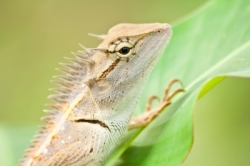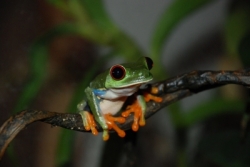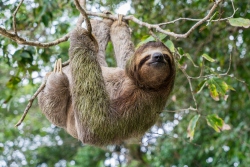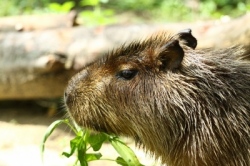The exotic pet trade has been characterized as a destructive industry that depletes wildlife populations, disrupts natural ecosystems, causes widespread animal suffering and threatens human health and safety. Globally, the wild animal pet trade involves thousands of species and millions of individual animals annually.
In the United States and Canada, millions of exotic pets, including small mammals, birds, reptiles, amphibians, fish and invertebrates, are kept by private individuals. While large numbers are bred in captivity, significant numbers are also captured from the wild. Many of these animals receive little more than the basic necessities of life and suffer from poor welfare and high mortality rates. Unfortunately, many animal protection and animal control laws pay little attention to or do not apply to a broad range of the small exotic pets.
WHAT IS ZOOCHECK DOING?
- Challenging abusive and/or outdated mass-market, pet industry (folklore) husbandry practices;
- Promoting ethical, evidence-based husbandry of all captive animals;
- Pushing for new laws, regulations and policies that better protect exotic animals kept as pets;
- Facilitating improved enforcement of existing laws, regulations and standards;
- Advocating for an end to the removal of wild animals from natural habitats for pet trade purposes;
- Facilitating, wherever possible, the rescue and relocation of exotic pets in need.
GENERAL INFORMATION
- Introduction to the Exotic Pet Trade Q & A
- Exotic Pet Welfare Needs
- Birds – Shelter and Rescue Information
- Reptiles, Amphibians and Fish – General Information
- Many animals across all classes are increasingly becoming victims of folklore husbandry (2019)
- Cold-Blooded Complications, Shelters and rescues struggle to care for reptiles sold as “loss leaders” (2014)
- The Motivations Behind Obtaining Exotic Pets
- How to Help
- Useful Links
ASSESSMENT & ENFORCEMENT INFORMATION
- Exotic Pet Issue Challenges and Realities
- Assessment and Enforcement Information
- EMODE Pet Score (suitability of animals as pets)
- Mobile Zoo (MLAP) Enforcement Checklist
- Mobile Zoos and Other Itinerant Animal Handling Events: Current Status and Recommendations for Future Policies (Animals, 2023)
- Wild Animals and Strict Liability: The African Lion Safari Case (exotic animal owner liability)
- Wild Animal Law – Online Legal Resource Canada
EXOTIC ANIMAL REGULATION
- How Positive Lists and Negative Lists Compare
- Positive List Questions & Answers
- Positive list vetting review process
- White Paper Positive Lists – Zoocheck
- A Commmentary on Prohibited (Negative) Lists for the Regulation of Animals Within a Jurisdiction (Zoocheck)
- Turning Negatives into Positives for Pet Trading and Keeping: A Review of Positive Lists (Animals 2020)
- Regulating Pets using an objective positive list approach (Journal of Veterinary Behaviour, 2021)
- An overview of national and international Positive Lists (September 2020)
- The Implementation of the Positive List for Mammals in Belgium (report) 2016
- FVE (Federation of Veterinarians of Europe) Position on Positive Lists of Exotic Species







